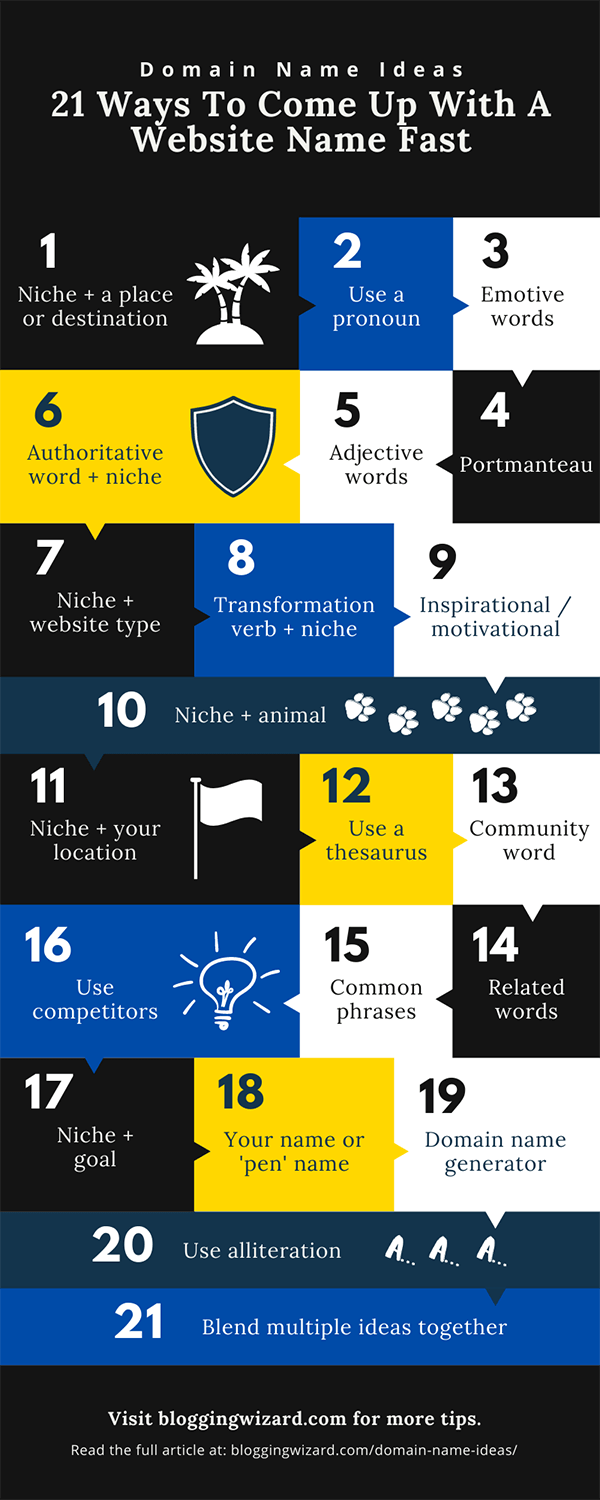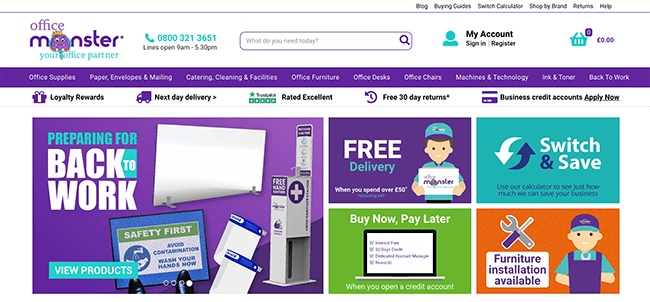Domain Name Ideas: 21 Ways To Come Up With A Website Name Fast (+ Infographic)

Looking to start a new website, but not sure what domain name you should choose?
In this post we’ll be going through 21 ways to come up with a website name – even if you have no idea what to name your website.
Let’s get started.
21 domain name ideas (infographic version)
Before you start reading the article, save this infographic for later. It’s a great prompt to kickstart your creativity.

Note: You’re more than welcome to share this infographic. But, if you publish it on your blog, be sure to include a credit link back to this post.
21 domain name suggestions to help you come up with the perfect website name
1. Your niche/keyword with a place or destination
A simple and easy way to create a domain name is take your niche/keyword and add a place or destination with it. You’re now giving the impression your website has a tangible location.
E.g. niche + place = fishingpalace.com (Fishing Palace)
A great example is Tone Island, a music website dedicated to exploring guitar related gear. This keyword is then added to the place of an ‘island.’ A simple but effective domain name.
This idea works well with all niches, especially those known to be based in a location. A great example are food and cooking blogs with the use of words such as kitchen, diner, and pantry etc.
2. Consider using a personal pronoun or noun to make it personal
Imagine scrolling through Google search results and coming across a result which has the domain name “Your Personal Yoga Trainer,” doesn’t it feel as though it’s your personal trainer?
Pick a domain name that uses a personal pronoun such as I, Me, Your, Our etc., as it can have a powerful impact on shaping the first impression a visitor has about your website before they’ve checked you out.
E.g. pronoun + niche = yourfishinghut.com (Your Fishing Hut)
Your Creative Aura uses this domain name idea, and it sounds personal, as though it’s tailored towards every reader who visits the website. It’s a great way to make each visitor feel important, as it symbolizes your main goal is to help them in whatever niche you’re covering.
It’s also an easy addition to make if you find out your domain idea has been taken. Can’t purchase sweetshop.com? Try yoursweetshop.com, or oursweetshop.com.
3. Use an emotive word with your niche/keyword
Humans are driven by emotions, therefore consider choosing a domain name that involves an emotive word. An emotive word adds an extra dimension of personalisation to your domain name, as it connects the visitor with who you are or what your website is about.
E.g. emotive word + niche = thepassionatefisherman.com (The Passionate Fisherman)
The Passionate Photographer uses an emotive word in the domain name. It also describes the owner, and the tagline “obsessed with all things photographic” portrays the passionate part perfectly.

You can implement this idea into any niche easily such as:
- The Inspired Writer for an author or storywriter website
- Blazing Beats for a music-style website
- Remarkable Technology for a technology website
4. Use a portmanteau using your niche/keyword and an additional relevant word
A portmanteau is the blending between two words to create a brand new word. Portmanteau are very common, and are used in websites as well as everyday situations, such as: sitcom (situation and comedy) and motel (motor and hotel).
Portmanteau are even used to create names such as Bulbasaur (Bulb and dinosaur) from the anime Pokémon.
E.g. niche + word = fishackle.com (Fishing & Tackle)
Pinterest is an example of a portmanteau, as it combines ‘pin’ and ‘interest’ into one word, also it defines what the website is about, pinning your interests onto a pinboard.
Using a portmanteau can make your website stand out, especially if you’re blending two words related to your niche. For example, for a beauty blog you could blend words like: foxy and eyeliner to result in ‘foxyliner’ or ‘eyelinoxy,’ or you could try beautician and mascara to result in ‘beautiscara’ or ‘mascutician.’
5. Play around with adjectives and descriptive words
Similar to using an emotive word, you can also use an adjective or a descriptive word tied in with your niche/keyword for your domain.
This works especially well with words ‘the’ and ‘an/a,’ if you struggle to find the domain name available.
E.g. adjective + niche = smartfisherman.com (Smart Fisherman)
The Smart Designer is an example of a domain name that uses an adjective. Their goal is to provide software solutions for interior design firms, in an easy, efficient and customizable fashion.
Common adjectives used in domain names are: easy, real, super and better, as these words can easily be placed in a domain name if yours is already taken.
You can apply them to any niche such as a technology website: easytechnology, realtechnology, supertechnology – without impacting or changing the purpose behind the website.
6. Never underestimate the power of an authoritative word
Portraying yourself as an expert in your niche is never always easy, even if you have an excellent level of knowledge.
One domain name idea is to include an authoritative word in it, such as Colonel, Captain, Officer etc, this way you add an extra element of authoritativeness to your website.
E.g. authority + niche = captainfisherman.com (Captain Fisherman)
Our very own Blogging Wizard uses this idea in its domain. We specialize in all aspects of blogging to a wizardry level of expertise.
Adding an authoritative word is easy for any website, especially if it’s an authoritative word related to your niche. For example, if your website revolves around education, words such as professor, teacher, instructor, tutor and principal work well in this niche.
7. Focus on the type of your website you’ll be crafting (e.g. news/magazine/educate etc.)
Not every website’s purpose is the same, some might be to showcase their work, some might be to provide information for others, whilst some sole purpose might be to connect people.
What type of website are you planning on crafting? What is the sole purpose of the website? Use this word and your niche/keyword to craft your domain name.
E.g. niche + type = thefishermansalbum.com (The Fishermans Album – a website dedicated to showcasing imagery of fishing)
An example of this is LiveScience.com, a website for the science geeks about the world of science that is trending or currently happening right now. The word ‘live’ demonstrates the type of content, as it is recent and up to date.
8. Add a transformation verb to your niche/keyword
Adding a transformation word into your domain name is a great suggestion if you find your original idea taken.
A transformation verb is an action involved with the alteration or change in one’s state. Examples of transformation verbs are: improve, renew, rapid and thrive.
E.g. verb + niche = rapidfishing.com (Rapid Fishing)
This domain name idea is perfect if the purpose of your website is to help or better the lives or situation of others.
An example of a transformation verb is BecomingMinimalist, who pursues to help and inspire others to lead a minimalist life and not heavily relying on possessions to make themselves feel happy and fulfilled.
9. Words that will inspire and motivate
Sometimes we need to find a way to pick ourselves up, and carry on. This is where an inspirational or motivational word can help make your website feel like it’s already helping others before they’ve even clicked on the link.
Words such as: ambition, believe and courage are great words to add to your niche/keyword.
E.g. Inspire + noun = joyfulfishing.com (Joyful Fishing)
Hopeful Living uses an inspirational word in the domain name, and it also ties in with their mission statement: “empowering YOU to gain clarity, discover dreams, build confidence and overcome fear.”
10. Your niche/keyword with an animal or imaginary creature
Release your inner beast, and imagine your website as an animal. What would it be? Using an animal, whether it’s real or imaginary is a great way to create an interesting domain name.
Also, with the added bonus of inspiration for a mascot, or logo.
E.g. niche + animal = fishingmonster.com (Fishing Monster)
Office Monster uses an animal not only in their domain name, but also in their brand identity.
Their tagline of “your office partner” tied in with their mascot of a little purple monster, makes the experience of visiting their website more fun and enjoyable.

You can add an animal into a domain name for any niche, as long as it’s one not to be taken too seriously. If your website is about a negative topic such as the damaging effects of pollution and toxic waste, having your domain name as ‘puppygarbage’ may not have the right impact, unless in the use of satire.
11. Consider your location or where your target audience might be
If your website is a business focused on gathering customers from a specific location such as a sweet shop in Bristol, adding this location to your domain name helps the visitors understand where they can find you – Sweet Shop Bristol.
E.g. niche + location = fishinguk.com (Fishing UK)
UK Linkology is an example of using a location in their domain name. They’re a link building business based in the UK, however they have clients worldwide.
You can add a location to any domain name idea you already have regardless of niche. For example if you’re creating a website for your SaaS, whether it’s for design or organizational services you can place your town, city or country at the beginning or end:
- DesignservicesUK
- UKdesignservices
Note: When considering the use of a location, just remember that it may limit your potential audience.
12. Use a thesaurus with your main idea
There is a limit to our vocabulary. This is where a thesaurus can be your lifesaver.
Perhaps you’ve found a great idea for your domain name, however it’s plain and generic such as – Total Fishing. Using a thesaurus can help you find several alternatives with a similar meaning.
E.g. Total Fishing = Absolute Fishing, Entire Fishing, Sheer Fishing, Utter Fishing
This means you can stay close to your original idea, especially if you find your original domain name has already been registered by someone else.
13. Add a community-style word to your niche/keyword
Depending on the purpose behind your new website, you may wish to use a community-style word in your domain name.
Adding a community style word such as Family, Tribe and League can help the visitor understand the type of website you’re running – and the level of engagement they expect.
E.g. community + niche = familyfishing.com (Family Fishing)
Different community-style words work well when applied to specific niches, depending on your target audience.
For example an accountancy agency could use words such as Association and Institute, which are perceived to be professional words. Whereas a lifestyle blogger may choose words such as Crew and Neighbours, which are perceived to be more friendly words.
14. Search for related words to your niche/keyword
Some of us may not wish for our domain name to be blatantly obvious such as – windowcleaningservices, however, still be related to our niche.
This is where the use of related words websites come in handy such as Related Words. Simply type in your niche/keyword and it will generate a bunch of words that are closely related.

Just by typing in the word ‘tech’ I can now generate a list of technology related domain name ideas without using the keyword:
- Technical Giants
- Micro Gadgets
- Chip Techies
- Titan Engineers
- Cicso Robotics
15. Think of a phrase or activity related to your niche/keyword
It can be difficult to try and create a domain name with your keyword, especially if it’s a popular keyword in your chosen niche. Take WordPress plugins as an example, there are so many domain names that use ‘wp’:
- WPEngine
- ManageWP
- WPSuperstars
- EasyWP
Searching for ‘WordPress Plugins’ in Google you get 13 results using ‘wp’ in the domain name just from the first 5 pages in Google. So it can be tempting to do the same thing and follow the crowd.
However, thinking outside the box and coming up with a phrase that is related to your niche/keyword can set your website apart from the others.
Take our example of fishing, we could use Family Fishing, Fishing UK, or The Passionate Fisherman, but each of these aren’t overly creative. Therefore we think of phrases or sayings that people may say about the niche.
Here we have two examples for our fishing niche:
- Captain Of The Seas
- Lady Of The Lake
They don’t have the keyword of fishing, however the phrase is relevant to the activity of fishing.
The great thing about this approach is that it gives your website more room to grow. For example, if we didn’t want to write about fishing specifically, or we ran out of article ideas for that topic, we could easily move to related niches.
16. Put a spin on competitors domain names
Finding inspiration can be vital to crafting the perfect domain name, and using competitors is a great way to spark an idea.
In your niche, make a list of all your competitors and take note of how they construct their domain name. Use the same method, and craft your own.
It could be something simple as using a thesaurus and changing one word, or changing one word to create alliteration.
Let’s use our fishing website as an example, and use tacklebox.com as our example competitor:
- Baitcrate.co.uk – thesaurus for both words
- Tackletrout.co.uk or beardfishbox.co.uk – alliteration on one word
17. Try using a domain name formula
We can create our own domain name formulas based on our niche/related keyword and a specific transformation. For example, we could put together a domain name based on your keyword/niche and the end goal you’d like each visitor to achieve whilst checking out your website.
E.g. niche/keyword + goal = littlefishinghabits.com (Little Fishing Habits)
Our goal in the example is for the audience to learn little habits that will come in handy whilst fishing.
We can tweak this formula further, here are a few extra suggestions:
- Niche/keyword + timeframe = 60secondfishing.com
- Niche/keyword + audience type = fishingforbeginners.com
18. If it’s a personal brand consider your name or a “pen name”
If you’re aiming to craft a brand surrounding your own identity, consider using your own name, or a pen name for your website.
E.g. Fred Simmons = FredSimmons.com
Adam, at Blogging Wizard has his own personal website branded with his own name – Adam Connell.
Using your name can be advantageous especially if you decide to change business direction in the future, however, on the downside it can be more difficult for people to define what you actually do, and selling your brand in the future would be difficult.
19. Consider using a domain name generator
Sometimes we can struggle to find the inspiration to find that right domain to register for our brand new website. In these situations a little helping hand is required – so consider using domain name generators.
Wordoid can produce made-up words for your domain name and also check its availability with GoDaddy or Namecheap.
Panabee is a search tool which generates a lot of ideas for your domain name. It also tells you which ones are taken, allows you to search via alternative domain extensions and related words.
20. Take advantage of alliteration to make your domain name memorable
You can have a lot of fun crafting a domain name using alliteration, it can also make your website more memorable to visitors.
E.g. Freds Fishing Facts = fredsfishingfacts.com (Fred’s Fishing Facts)
Dunkin’ Donuts have been “dishing out delicious donuts” for over 60 years, and with a name like that it’s no surprise!
Alliteration could be just what you need to find a memorable domain name, and can work for any niche. Let’s take a parenting blog as our example, using alliteration we could craft:
- Maternal Mother Mayhem
- Babbling Babies
- Fun Fit Families
21. Blend together multiple ideas
Using one domain naming suggestion on this list might not be enough for you to find a unique domain that is available for you to purchase. When this problem rises, try blending together multiple ideas.
Here are a few examples:
- Noun + verb + keyword = The Running Fisherman
- Emotive + keyword + location = The Passionate Fisherman UK
- Pen name + related word + type + alliteration = Andy’s Aquarium Album
A quick summary of the domain name ideas we’ve covered…
Let’s summarize all 21 domain name ideas:
- Niche + a place or destination
- Use a pronoun with your niche
- Emotive word + niche
- Create a portmanteau
- Adjective + niche
- Authoritative word + niche
- Niche + website type
- Transformation verb + niche
- Inspirational/motivational word + niche
- Niche + animal
- Niche + your location
- Use a thesaurus with your main idea
- Community + niche
- Search for niche related words
- Related phrases for your niche
- Use competitors for inspiration
- Niche/keyword + goal
- Use your name or a ‘pen name’
- Domain name generator
- Use alliteration
- Blend together multiple ideas
Finding the perfect domain name doesn’t have to be difficult, especially when you have 21 ideas and suggestions that can spark inspiration for your next website.
Once you’ve found your domain name the next step is to purchase it. Namecheap is our go-to domain name registrar. It’s an excellent place to check the availability of the domain name, and what TLD’s are available using it such as .com, .net etc.
If you need further tips on choosing a domain name, check out our guide on How To Choose A Domain Name For Your Blog.
And, if you’d like to brush up on the basics, check out these articles:
- How To Register A Domain Name And Update DNS
- How To Find Out Who Owns A Domain Name
- What Is DNS? And How Does The Domain Name System Work?
- What Is A Domain Name? And How Do They work?
- The Best Domain Registrars To Purchase Your Next Domain
- 17 Best Website Ideas For Beginners (+ Examples)
Disclosure: Our content is reader-supported. If you click on certain links we may make a commission.

